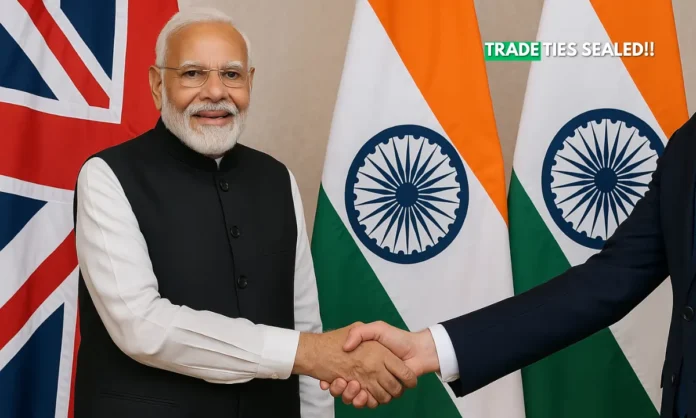Summary
- India-UK Free Trade Agreement to slash tariffs on Scotch whisky, UK cars, and luxury goods.
- Indian exports, including textiles and jewellery, to gain near duty-free access to UK markets.
- Agreement projected to add £4.8 billion annually to the UK’s GDP and boost bilateral trade to $120 billion by 2030.
A Landmark Trade Pact to Reshape India-UK Economic Ties
India and the United Kingdom are set to sign a landmark Free Trade Agreement (FTA) on Thursday during Prime Minister Narendra Modi’s visit to London, marking the culmination of nearly three years of complex negotiations. This will be India’s first major bilateral trade pact with a developed economy in over a decade and is expected to significantly reduce trade barriers, enhance sectoral growth, and foster a deeper economic partnership between the two nations.
The FTA, formally titled the Comprehensive Economic and Trade Agreement, is poised to come into effect within a year, following ratification by the British Parliament and approval by India’s Union Cabinet. With provisions designed to slash tariffs, ease service sector mobility, and open up procurement channels, the deal aims to double bilateral trade to $120 billion by 2030. For India, this agreement aligns with its vision of expanding global market access for its high-potential industries, while for the UK, it offers a fresh opportunity to strengthen post-Brexit trade alliances.
🇮🇳🤝🇬🇧 BIG DEAL BREWING: India-UK FTA to Be Signed Next Week
— The Wonk (@thewonkin) July 18, 2025
👉99% of Indian exports to UK = #tariff free
👉UK whisky duties to drop from 150% to 40%
👉Target: $120B trade by 2030#indiauktradedeal #delhischools #tontawan #aekfc #Modi pic.twitter.com/OrHdejq594
Who Wins from the India-UK FTA?
- Scotch whisky and gin: Import duties in India will be cut from 150% to 75% immediately, with further reductions to 40% over the next decade.
- Luxury automobiles: Tariffs on UK-made cars, which currently exceed 100%, will fall to 10% under a quota system.
- Indian exports: 99% of Indian products, including textiles, footwear, gems, jewellery, and machinery, will receive duty-free access to the UK.
This FTA is particularly advantageous for India’s labour-intensive sectors. Companies like Welspun India, Arvind Ltd., Bata India, and Relaxo are expected to see a sharp rise in exports, while Tata Motors and Mahindra Electric will benefit from preferential access for electric and hybrid vehicles. The UK, in turn, will gain improved access to India’s fast-expanding consumer base, with British companies such as Diageo, Aston Martin, and Jaguar Land Rover (owned by Tata Motors) emerging as key beneficiaries.
Services and Mobility: A Game-Changer for Professionals
- Short-term visas: Indian yoga instructors, chefs, musicians, and other professionals will receive temporary entry to the UK under contractual services agreements.
- Social security relief: Indian professionals will be exempt from paying UK social security contributions for up to three years, potentially saving an estimated Rs 4,000 crore annually.
- Government procurement: UK companies will be able to bid on non-sensitive Indian government contracts above Rs 2 billion, tapping into a market worth Rs 4.09 lakh crore annually.
The agreement also opens the door for progressive measures in the services sector, particularly IT, healthcare, and education, where India’s skilled workforce is highly sought after.
Economic Impact and Strategic Significance
- Indian companies in the UK: Over 1,000 firms employ more than 100,000 people and have invested $20 billion.
- UK investments in India: The UK ranks as India’s sixth-largest investor with $36 billion invested.
- Projected gains: The FTA is expected to boost the UK’s GDP by £4.8 billion annually, while India aims to increase its export volume to match its fast-growing domestic production capacity.
This agreement also signals a broader strategic shift in India’s trade diplomacy, balancing partnerships between Western economies and its expanding Asian trade bloc engagements.
The Road Ahead for Bilateral Trade
As Prime Minister Modi prepares to meet his UK counterpart, Keir Starmer, the FTA sets a strong foundation for enhanced collaboration across trade, technology, energy, and security. Both nations are betting on this deal to not only boost their economies but also set a model for future trade pacts that integrate goods, services, and intellectual property rights into a single comprehensive framework.
The long-term implications of this FTA extend beyond economics—it reflects a shared intent to strengthen geopolitical alliances amid global uncertainties, from energy security to climate resilience.


